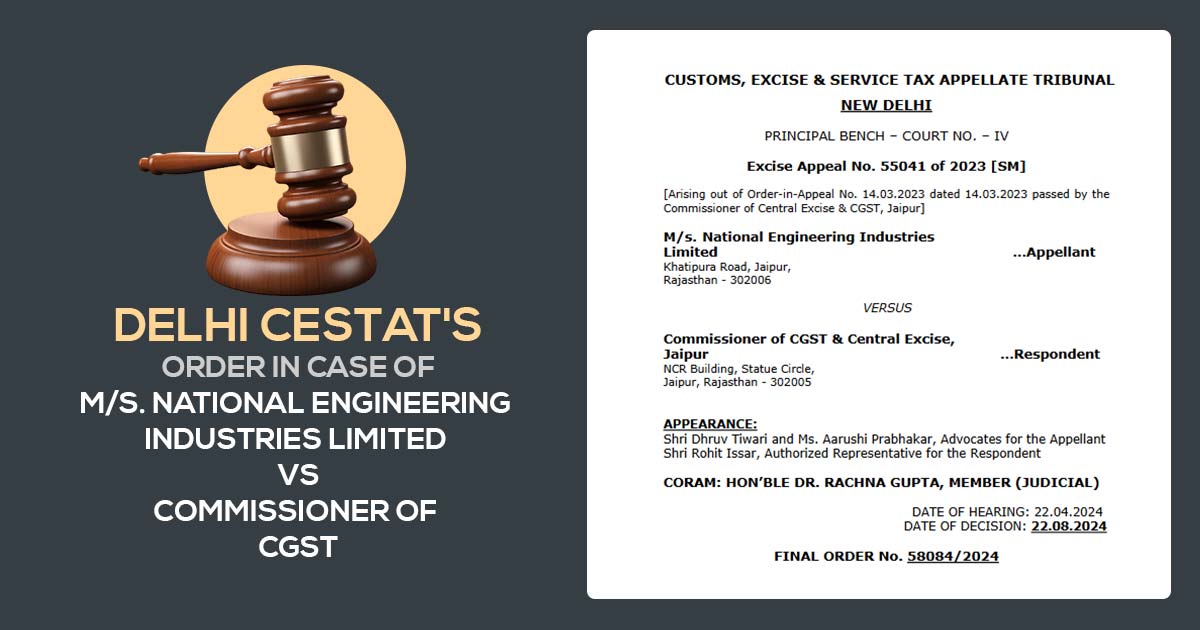
The Delhi Bench of Customs, Excise, and Service Tax Appellate Tribunal (CESTAT) ruled that a wrong address cited in invoices cannot be a reason to deny CENVAT credit.
It was noted by the bench of Rachna Gupta (Judicial Member) that the invoices with the wrong addresses issued via the input service providers comprise all the requisite particulars as needed under the proviso to Rule 9(2); hence, Cenvat credit could not be refused to the appellant. Rule 9(2) nowhere needs to cite the address of the service receiver.
The proviso to Rule 9(2) of the Credit Rules shall be invoked merely when the conditions under Rule 4A of the Service Tax Rules, 1944, read with Rule 9 of the Credit Rules, are not satisfied.
Read Also: CESTAT Mumbai Permits Refund of Service Tax on Canceled Flat Bookings
The petitioner/taxpayer is in the business of manufacturing bearing, carrying components, and machines and was indeed holding the service tax registration for furnishing the services as business auxiliary services, consulting engineering services, etc.
At the time of the audit and verification of the Cenvat records of the input services kept by the appellant, it was noted that they had incorrectly claimed the Cenvat credit for the input services on the grounds of the invoices that were not specified documents as per Rules 4(7) and 9 of the Cenvat Credit Rule, 2004.
It has appeared to the department that differences had been encountered in the audit- otherwise, the points may not have to learned to the department. Therefore the appellant is alleged to have suppressed the points from the department of evading the payment of central excise duty.
Read Also: Service Tax Payable on Buses Used for Carrying Passengers Can’t Be Considered Goods Transport
Hence the incorrectly opted Cenvat credit of Rs 12,62,017 on the input services was offered to be recovered with proportionate interest and precise penalties. The suggestion has been confirmed. The petition against the order was dismissed.
It was argued by the taxpayer that the invoices issued via the service providers comprise all the information mentioned under Rule 9(1)(f) of the Credit Rules, read with Rule 4A(1) of the Service Tax Rules.
The mere objection raised in the Show Cause Notice (SCN) and endorsed via both the lower authorities below is that the invoices do not comprise the correct address of the petitioner, and hence these invoices fail to fulfil the need of Rule 4A(1) of the Service Tax Rules.
While permitting the petition the tribunal ruled that in the absence of any proof from the department that the units cited in the invoices are the service recipients, those units have accounted for those invoices in their accounts, or that any other unit than the name of the petitioner in the invoices based on which the appellant has claimed the Cenvat credit is nothing but a procedural lapse, the substantial benefit cannot be refused.
| Case Title | M/s. National Engineering Industries Limited Versus Commissioner of CGST & Central Excise |
| Appeal No | Excise Appeal No. 55041 of 2023 [SM] |
| Date | 22.08.2024 |
| Appearance | Dhruv Tiwari |
| Counsel For Respondent | Rohit Issar |
| Delhi CESTAT | Read Order |